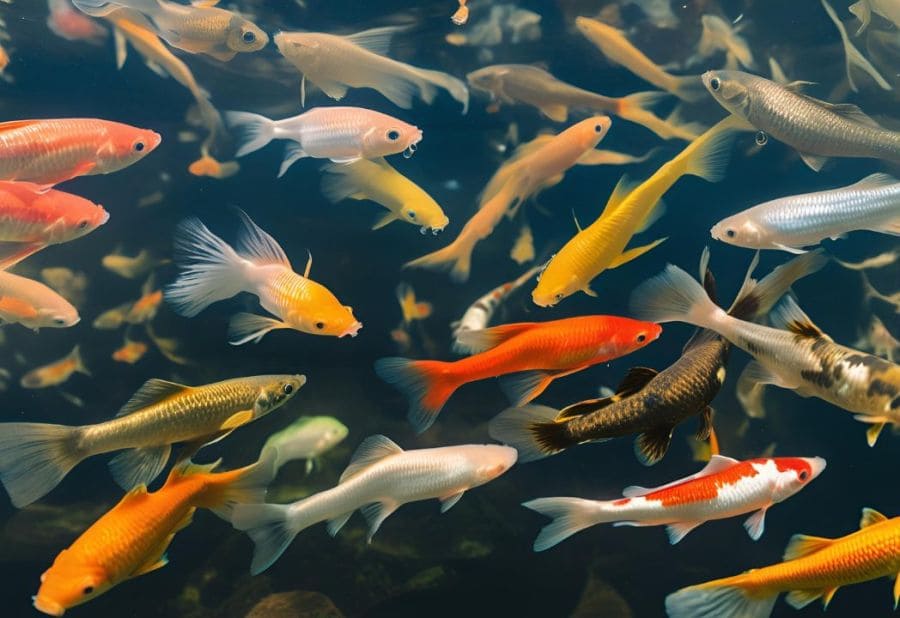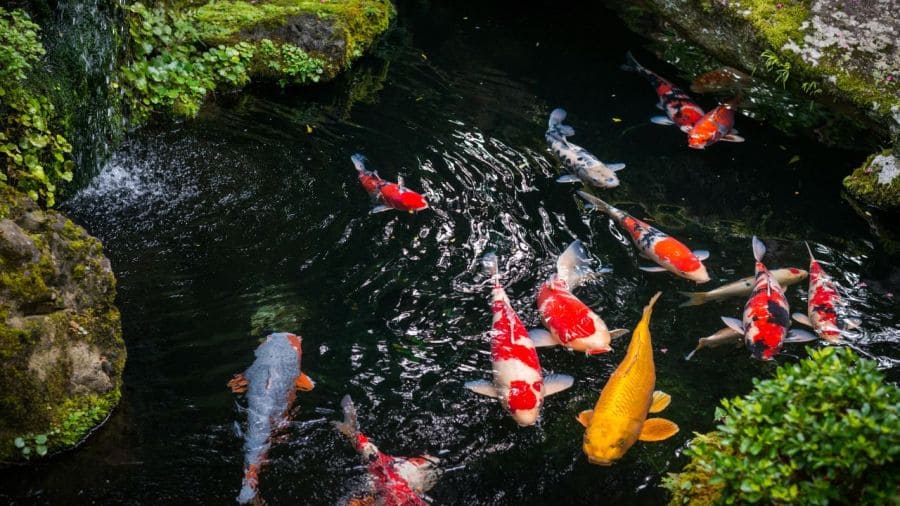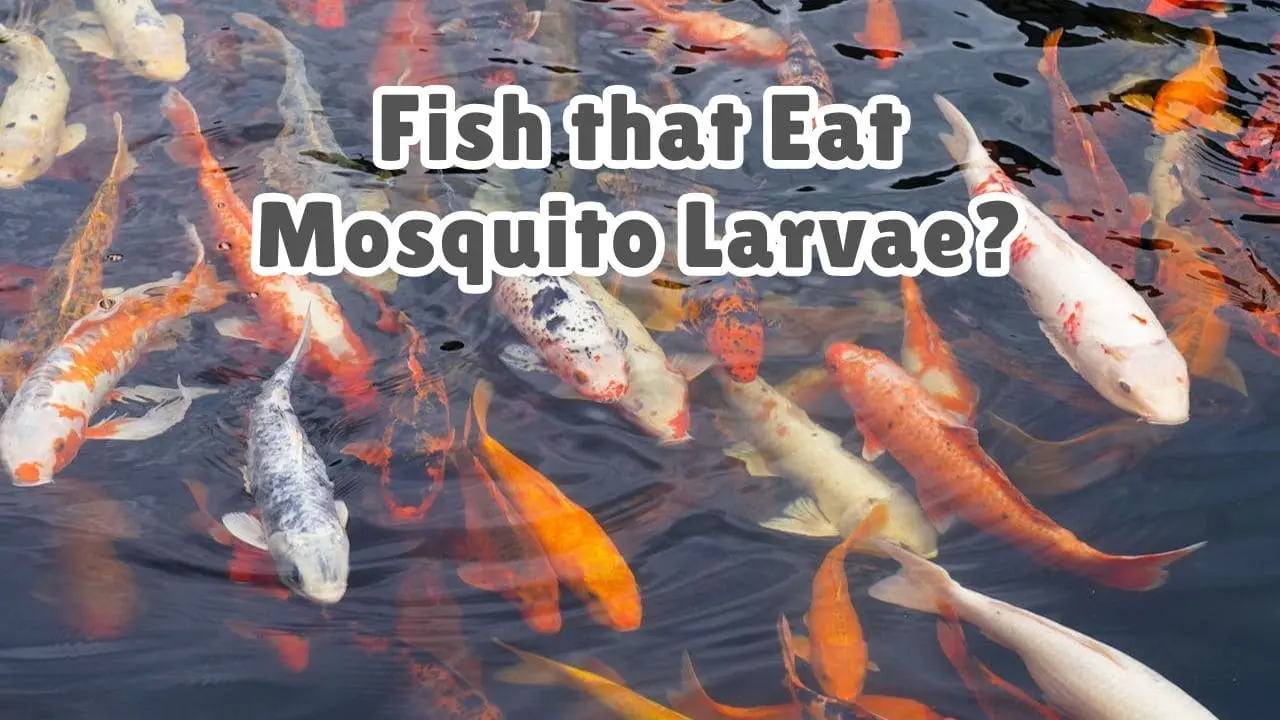If you have an ornamental pond, water feature or an aquarium in your garden than you might be thinking every now and than about natural predators of mosquito larvae like different insects and, what fish eat mosquito larvae? You should be thinking this because mosquito predatory fish are the best and natural option for controlling mosquito population. In this article, we will explore different fish varieties that feeds or prey on mosquito larvae.
Table of Contents
Who eats mosquito larvae?
Mosquito larvae are immature mosquitoes, that are at the second stage of development in mosquitoes life cycle which are formed after hatching of eggs in standing water sources. These mosquito larvae has aquatic stage of development, and controlling their population and breeding at this stage is the easiest way of getting rid of mosquitoes.
To control mosquito populations at this stage, we often use many different species of fish, insects, and other aquatic natural predators that eats mosquito larvae. Fish are the most efficient mosquito larvae predators especially in ponds, lakes, fountains, water features and aquariums. There are certain types of insects, birds as well as animal species that feeds on mosquito larvae at different stages of their life.
Introducing such natural predators that eats mosquito larvae in and around the environments where mosquitoes breed, we can considerably reduced mosquito population.
What fish eat mosquito larvae in ponds and aquariums?
There are many important larvivorous fish varieties that are useful in keeping a check on mosquito larvae infestation in ponds and aquariums. These mosquito larvae eating fish includes:

Image Credit: AI Imagined with Canva Pro
- Mosquito Fish (Gambusia affinis) or Top Water Minnows: These are called mosquitofish because they are the most effective fish that eats mosquito larvae and are most used in biological control of mosquitoes than any other fish. Adult gambusia eat mainly the mosquito larvae and nymphs of other aquatic insects, and also some plant and organic sources like algae, diatoms, planktons, and detritus materials.
However, they should not be kept only on larval based diet, as they may face higher mortality. These mosquitofish eats mosquito larvae from 42 to 167% of its own body weight. Also, if there is dense vegetation in the water body; their mosquito eating efficiency goes down. - Guppies (Poecilia reticulata): Guppies also known as rainbow fish or million fish, are another best choice for mosquito control mainly in ponds and aquariums. They also eat algal remains and other organic matter like diatoms, zooplankton, detritus, plant fragments, nymphs of aquatic insects and mosquito larvae.
However, due to their uncontrolled reproduction and breeding which may imbalance the ecosystem, they are not used in lakes as they may affect the native fish populations. They also eat eggs of native fishes and are invasive by nature. Because of the above reasons, the guppies poses danger and risks of damaging local aquatic ecosystems. - Goldfish (Carassius auratus): Goldfish are beautiful colorful species that adds aesthetics to your pond or aquarium. Along with it they are also very good at eating mosquito larvae, and as they show incompatibility to certain ecosystems and climatic conditions, they are not deployed in larger water bodies like bigger ponds and lakes. The goldfish are not that effective but they can contribute to some extent in smaller ecosytems like garden ponds, aquariums, etc.
- Killifish (Fundulidae family): They can easily survive and adapt to external conditions and habitats and therefore they are most suitable for outdoor deployment. These are quiet small and tiny in size and can live in brackish as well as fresh water and can adapt to any changes in water quality and temperature. More than 40 species of killifish out of which some eats mosquito larvae and others mainly depends on aquatic crustaceans, insects larvae and worms.
Least killifish (Heterandria formosa) is one of the known killifish species that eats mosquito larvae. - Betta fish (Betta splendens): Betta fish are also known for their contribution towards mosquito control, mainly in smaller ponds and aquariums. Not that efficient at eating mosquito larvae but can be useful in small water features and aquariums. They mainly feed on bloodworms, daphnia, cyclops, and mosquito larvae. Betta fish prefer slow moving waters and therefore they can be useful in ponds with manmade agitation or filtration system that gives slow movement to water.
- Tetra fish: Tetra is a group of many small freshwater characiform fishes. They are not that effective in mosquito control, but they are preferred in aquariums due to their peaceful nature and colorful appearance. They are preferably deployed along with other mosquito larvae eating fish in controlled small water bodies, and cannot be relied for outdoor settings.
- Molly: Some varieties of molly fish like sailfin mollies and black mollies eat mosquito larvae and pupae. Mainly they feed on algae and plant materials including vertebrates and larvae of aquatic insects. Prefer to live in edges of marshes, lowland streams, ponds and able to survive and adjust in saline and brackish waters. Due to their compatibility with other fish species they can coexist peacefully in major water bodies. They are used in integrated mosquito control strategies in ponds and various small water bodies.
- Koi: Koi fish are larger in size, beautiful and ornamental in appearance, and most preferably kept in outdoor ponds and water features. Along with algae, plant matter and insects they also eat mosquito larvae as and when available. Due to their large size and appetite, they can be deployed in outdoor ponds where they can eat some of the mosquito larvae, not that effective as mosquitofish or guppies.
Koi require sufficiently adequate space for movements and well maintained clean ponds with filtration systems. They are best suited for outdoor settings like large water features, fountains, ponds, etc.

Image Credit: Canva Pro
The other not so common varieties of fish that eats mosquito larvae are:
- Eastern Silvery Minnow
- Fathead Minnows
- Bluegill
- Bass
- Catfish
- Firetail gudgeons
- Perch
Most of these mosquito larvae eating fish are larger in size and they eat larvae at their young age only, not after they mature. Also, there are many ponds and aquarium fish that eats mosquito larvae, but fall a prey to their predators and so their numbers fall down when kept in outdoor settings like ponds and water features. You need to keep a check on their numbers and replenished to maintain the control over mosquito populations.
What fish eat mosquito eggs?
As most of the fish prefer to eat mosquito larvae, but there are certain species who also eats mosquito eggs. Mosquitofish, guppies and some species of killifish are known to eat mosquito eggs also. These fish generally swim and feed near the surface of water and therefore they can easily find and eat mosquito eggs. These mosquito eggs are also valuable food source for these small fish species.
What fish eats most mosquito larvae?
Gambusia affinis is the most effective fish that eats mosquito larvae, and they can eat upto 100 larvae in a day and therefore they are also called as mosquitofish. They reproduce quickly and adapt to different water environments more easily. This makes them one of the best method to control mosquito populations in mosquito breeding water bodies.
The mosquitofish are highly efficient as they consume enormous amount of mosquito larvae in a day. They are used worldwide, and deployed in a large scale for mosquito control programs and operations.
Does tetra fish eat mosquito larvae?
The larger species of tetra fish mainly the ‘Black skirt tetra fish’ are known to eat mosquito larvae, but they are not as effective as mosquitofish and guppies. Because of their colorful and attractive looks they are added to aquariums, and if mosquito larvae are present they will eat some of them, depending on circumstances and availability of alternate food sources.
Due to their limited effectiveness the tetra species are not solely deployed in any mosquito control programs. Therefore, they are not added to larger mosquito breeding sites like ponds or lakes, where usually mosquito fish and guppies are better options.
What is the best fish to control mosquitoes?
The best fish for mosquito control depends on the size of the water body, the climate of the region, and the ability of the fish to adapt the existing ecosystem. Most of the cases, mosquitofish remains the unbeatable choice but even guppies and goldfish are used under certain circumstances where they also provide the desired effective mosquito control effect.
The following five varieties are the well known and best fish varieties to control mosquitoes:
- Mosquitofish (Gambusia affinis)
- Guppies
- Goldfish
- Killifish
- Betta fish
Conclusion: Different fish that eat mosquito larvae
Different fish can be introduced in mosquito breeding sites like ponds, lakes, fountains, water features, aquariums, etc. as a natural method of mosquito control. There are known fish varieties that are most efficient in eating mosquito larvae and eggs, like mosquitofish, guppies, killifish, goldfish, etc. These fish reduce the mosquito population and limit any chances of transmitting and spreading any vector borne diseases.
Introducing larvivorous fish as natural methods for mosquito control can reduce the requirement of chemical based larvicides and insecticides. Thus, for a mosquito free environment it is advised to use the effective species like mosquitofish and along with natural larvicides like mosquito dunks, which are safe and do not harm the environment.
Frequently Asked Questions (FAQs)
-
What kills mosquito larvae in aquarium?
In aquarium, we can add small carnivores fish like mosquitofish, guppies and gold fish that will eat mosquito larvae and their eggs. Also, we can add mosquito bits in small quantities that will take care of any major mosquito infestation without harming any fishes.
-
Do mollies eat mosquito larvae?
Yes mollies do eat mosquito larvae. The two preferred species of mollies for mosquito control are sailfin mollies and black mollies. Mollies are not that effective as compared to mosquitofish and guppies but depending on the size and nature of waterbody, we can use them accordingly in combination with other species.
-
Do koi fish eat mosquito larvae?
Yes, koi fish eat mosquito larvae and due to their large size and appetite they are easy to deploy in outdoor ponds. They can be used in combination with more effective fishes like mosquitofish and guppies.

